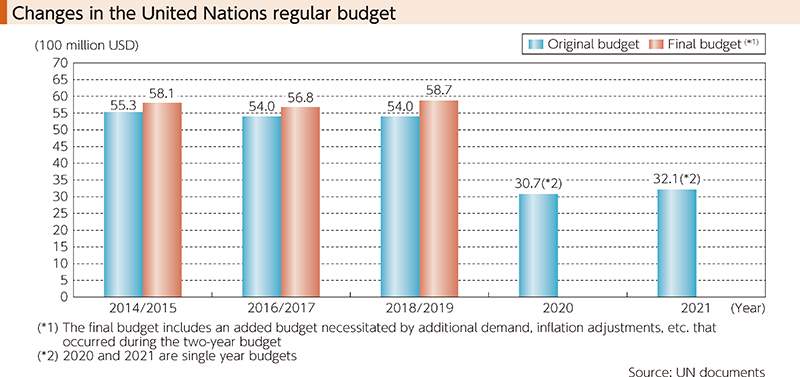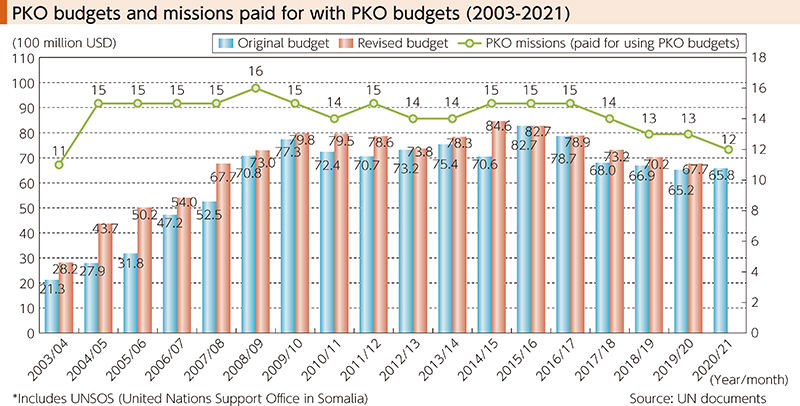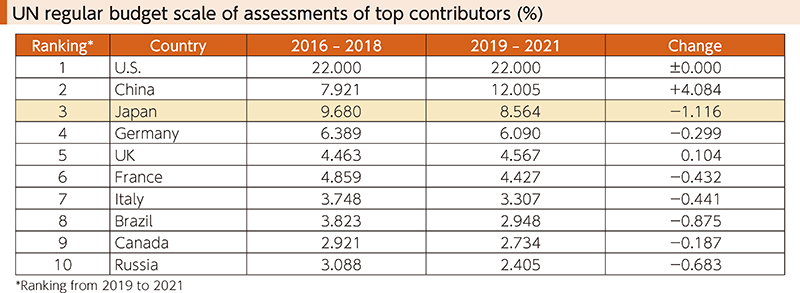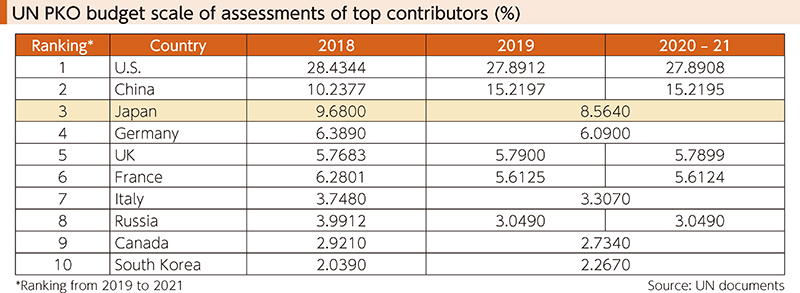Diplomatic Bluebook 2021
Chapter 4
Japan Strengthening Its Presence in the International Community
5 Japan's Efforts at the United Nations
(1) Japan-UN Relationship
The UN, which celebrated its 75th anniversary in 2020, is an international organization that nearly all the countries in the world are currently members of (193 countries as of December 2020). It addresses various challenges in diverse areas such as conflict resolution and peacebuilding, counterterrorism, disarmament and non-proliferation, poverty and development, human rights, refugee issues, environment and climate change issues, disaster risk reduction and infectious diseases.
The UN has two facets, functioning as the world's largest forum for Member States to gather and engage in negotiations (universality), as well as consolidating information and knowledge from expert organizations and making recommendations for the optimal solution (expertise). Since joining the UN in 1956, Japan has leveraged on both universality and expertise to realize policy aims through multilateral cooperation in a wide range of areas, including the three pillars of the UN─peace and security, development and human rights. An important example of this is the key role that Japan has fulfilled in the maintenance of international peace and security, such as having served as a non-permanent member of the UN Security Council 11 times, more frequently than any other UN Member State. In order to support such activities, the Government of Japan contributes financially to the UN while also actively engaging in the organizational aspects (management) of the UN. Japan also supports Japanese staff who play active roles in the UN, and puts effort into helping them gain appointment to important posts (see Chapter 5, Section 1, 2(1)).
Today, 75 years since the founding of the UN, we face the pressing challenge of making the UN efficient, effective and appropriate for the 21st century. Japan continues to proactively engage in UN reform, including UN Security Council reform.
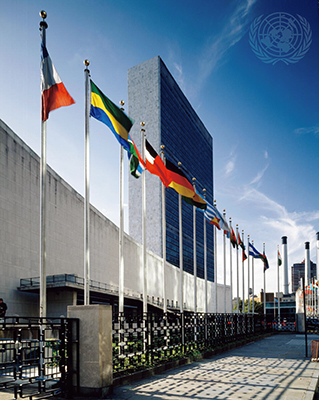 United Nations Headquarters
United Nations Headquarters(Photo: UN Photo/Andrea Brizzi)
(2) Major Events in 2020
Due to the impact of the COVID-19 pandemic, the high-level meeting of the 75th UN General Assembly was convened in September through the screening of pre-recorded speeches by each member state in the Assembly Hall. It was the first time that the meeting was held in such a format, and it was attended by Prime Minister Suga and Foreign Minister Motegi from Japan.
In his address at the UN General Assembly, Prime Minister Suga called on the international community to unite in solidarity so as to turn the unprecedented COVID-19 crisis into an opportunity to reinforce cooperation based on multilateralism. He stated that the spread of the coronavirus is a human security crisis, and that Japan will lead international efforts toward the attainment of universal health coverage (UHC). He also spoke about the need to “build back better” from the COVID-19 pandemic, and to create a flexible yet resilient society where the SDGs have been achieved. To that end, he emphasized the importance of the following three points that Japan will work on proactively: the UN and multilateralism; international peace and security; and the rule of law. He also said that Japan will spare no effort to bring about the early resolution of the abductions issue by North Korea, and toward the realization of a world without nuclear weapons. Finally, he expressed Japan's determination to host the Olympic and Paralympic Games Tokyo 2020 in the summer of 2021, as a symbol of overcoming COVID-19.
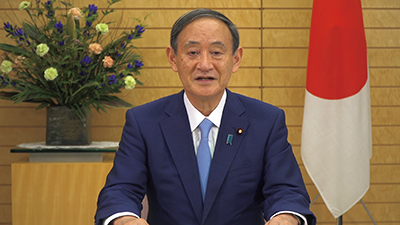 Address by Prime Minister Suga at the Seventy-Fifth Session of the UN General Assembly (pre-recorded video)
Address by Prime Minister Suga at the Seventy-Fifth Session of the UN General Assembly (pre-recorded video)(September 26, Photo: Cabinet Public Relations Office)
Prime Minister Suga also took the opportunity of the high-level meeting to hold a telephone call with UN Secretary-General António Guterres. In the talk, they exchanged views on ways to address COVID-19, and Secretary-General Guterres reiterated his appreciation to the contributions made by Japan. At the same time, they agreed that they would continue to cooperate in a wide range of areas, including peacebuilding, development and climate change. As for North Korea, Prime Minister Suga asked for continuous understanding and cooperation toward the early resolution of the abductions issue, for which Secretary-General Guterres expressed his full support. Secretary-General Guterres also emphasized the importance of promoting denuclearization.
In his statement delivered at the high-level meeting to commemorate the 75th anniversary of the UN, Foreign Minister Motegi emphasized the importance of multilateralism in the UN and the need to undertake efforts with a view to the post-COVID-19 world. He also conveyed Japan's position on UN reform, including UN Security Council reform. At the same meeting, the Declaration on the Commemoration of the Seventy-Fifth Anniversary of the United Nations, marking the milestone anniversary of the UN, was adopted.
Foreign Minister Motegi also worked on strengthening the mutual relationship of trust with the foreign ministers of other countries, and to communicate Japan's policies and stance to the international community, such as by attending the Meeting of the Foreign Ministers of the G4 Countries on UN Security Council Reform, the 13th Global Governance Group (3G) Ministerial Meeting, and the high-level meeting on financing the 2030 Agenda for Sustainable Development in the era of COVID-19 and beyond (all of which were convened online), as well as releasing a video message along with the foreign ministers of the respective countries for the Friends of the Comprehensive Nuclear Test Ban Treaty (CTBT).
In November, Foreign Minister Motegi held a telephone call with Mr. Volkan Bozkir, President of the 75th session of the UN General Assembly. During the talk, they confirmed that they will cooperate to further vitalize discussions on human security, as well as work together to promote the reform of the UN including the reform of the Security Council. Foreign Minister Motegi also sought understanding and cooperation toward the early resolution of the abductions issue and gained the support of Mr. Bozkir.
(3) United Nations Security Council and its Reform
A United Nations Security Council
The UN Security Council holds the primary responsibility within the UN for maintaining international peace and security. It is composed of five permanent members and ten non-permanent members that are elected by UN Member States (for two-year terms). Its activities, including Peacekeeping Operations (PKOs) based on UN Security Council resolutions, are diversifying, and the Council's role has been expanding year by year, encompassing the efforts to address new threats such as the proliferation of weapons of mass destruction and terrorism.
Japan has served as a non-permanent member of the UN Security Council 11 times, more frequently than any other UN Member State, and has contributed proactively to discussions on topics such as country-specific situations and peacebuilding. During its term on the Council from January 2016 to the end of December 2017, Japan made every effort to resolve North Korea's nuclear and missile issues, including contributions to drafting the six UN Security Council resolutions adopted in response to North Korea's repeated ballistic missile launches and three nuclear tests conducted in January and September 2016 and September 2017. At the UN Security Council Briefing on Non-proliferation/Democratic People's Republic of Korea in December 2019, Japan was fully engaged in discussions related to maintaining international peace and security by stating that North Korea's ballistic missile launches were in violation of relevant UN Security Council resolutions and posed a serious challenge not only for Japan but also for the international community as a whole, as well as calling for the importance of the full implementation of relevant UN Security Council resolutions. Japan will contribute to the maintenance of international peace and security by seeking to become a non-permanent member of the Council as frequently as possible, until such time as reform, including the admission of Japan as a permanent member of the Council, is achieved. From this point of view, Japan is running for the Security Council non-permanent membership at the elections to be held in 2022.
B Reform of the UN Security Council
75 years have passed since the UN was established, and the structure of the international community has changed significantly while the UN's functions have grown increasingly diverse. Despite this, the composition of the UN Security Council has basically remained unchanged to this day. There is broad recognition, among the international community, of the necessity for promptly reforming the UN Security Council in a way that improves its legitimacy, effectiveness, representativeness and transparency. In particular, in the Declaration on the Commemoration of the Seventy-Fifth Anniversary of the United Nations, all the leaders of the world committed to “instill new life in the discussions on the reform of Security Council.”
Japan has contributed proactively to the international community in areas such as disarmament and non-proliferation, peacekeeping and peacebuilding, and human security, among others. To play an even more proactive role toward the realization of world peace and security through the UN, Japan has been making efforts to convince other countries to pursue the early realization of UN Security Council reform, with the expansion of both permanent and non-permanent seats and Japan's admission as a permanent member.
C Recent Activities Regarding UN Security Council Reform
Since 2009, in the UN General Assembly, Member States have been engaging in the Intergovernmental Negotiations on UN Security Council reform. In January, Japan invited the Co-chairs (UN Permanent Representatives of the United Arab Emirates and Poland) of the 74th session of the General Assembly Intergovernmental Negotiations to Japan, and affirmed its cooperation toward the realization of Security Council reform. Thereafter, Intergovernmental Negotiations were held once in February and March respectively under the same Co-chairs, but could not be held after that due to the impact of the COVID-19 pandemic. At the end of August, the decision to transfer the work of the 74th session to the 75th session was adopted by consensus at the UN General Assembly.
Mr. Bozkir, President of the 75th Session of the UN General Assembly, reappointed the UN Permanent Representative from Poland to continue serving as a Co-Chair of the Intergovernmental Negotiations as a carry-over from the 74th session, while also appointing the UN Permanent Representative from Qatar to serve as a new Co-Chair of the Intergovernmental Negotiations.
Japan also places great importance on its initiatives as a member of the G4 (Japan, India, Germany and Brazil), a group that cooperates on promoting UN Security Council reform. Foreign Minister Motegi attended the Meeting of the Foreign Ministers of the G4 countries that was held online in September. At the meeting, the G4 Foreign Ministers confirmed their intention to call for a prompt starting of the Intergovernmental Negotiations in the current session of the General Assembly, and to continue aiming for improvement in the Intergovernmental Negotiations process as well as launching substantial negotiations based on a text. In addition, the Foreign Ministers stressed that the increased representation of countries with the capacity and willingness to contribute to the maintenance of international peace and security, and of Africa, is indispensable to enhance the capacity of the Security Council to deal with contemporary global challenges. The Ministers shared the view that they would further step up their close collaboration with other like-minded countries to achieve an early reform of the Council. Japan will continue to engage proactively in the process for realizing UN Security Council reform, in close cooperation with reform-oriented countries.
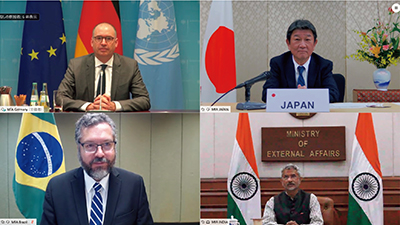 Meeting of the Foreign Ministers of the G4 Countries (Japan, India, Germany, Brazil) on UN Security Council Reform (September 23, held via videoconference)
Meeting of the Foreign Ministers of the G4 Countries (Japan, India, Germany, Brazil) on UN Security Council Reform (September 23, held via videoconference)(4) Organizational Aspects of the United Nations (Management)
A Management
UN Secretary-General Guterres positions the management reform of the UN as a priority issue, alongside efforts for peace and development, and has been working toward enhancing the efficiency and effectiveness of the functions of the UN Secretariat. A new organizational structure was launched in January 2019, and an annual regular budget system was introduced on a trial basis from 2020 (see B below), as a part of the ongoing efforts to promote the effectiveness of the UN's financial, budgetary and human resource management. Japan is supporting the objectives of the reform through deliberations pertaining to the management of the UN at its General Assembly as well as dialogues with the UN Secretariat, with the hope that these efforts will produce concrete results and that the UN will fulfill its mission more effectively and efficiently.
B Budget
The UN budget is mainly composed of the regular budget for general activities (a biennial budget for the period from January to December of the next year; an annual budget from January to December of the same year has been implemented on a trial basis from 2020 to 2022), and the peacekeeping budget related to peacekeeping operations (an annual budget for the period from July to the following June).
With regard to the regular budget, a budget for 2021 amounting to approximately 3.2 billion US dollars was approved in December 2020 at the UN General Assembly. The budget for peacekeeping operations for the period of 2020-2021 amounting to approximately 6.58 billion US dollars in total was approved in June 2020 (a decrease of approximately 2.6% from the final budget of the previous period).
The budget to support the UN activities is composed of assessed contributions paid by Member States and voluntary contributions provided in accordance with Member States' policy needs. Assessed contributions are revised as necessary based on the financial capacity of Member States. Based on Japan's current scale of assessment of 8.564% (2019-2021), which ranks third after the U.S. and China, Japan contributed approximately 238.57 million US dollars to the UN regular budget for 2020, and approximately 560.78 million US dollars to the peacekeeping budget for 2020. As a major financial contributor, Japan has been encouraging the UN to make more efficient and effective use of its financial resources.
Key bodies that address administrative and budgetary matters of the UN are the Advisory Committee on Administrative and Budgetary Questions (ACABQ) and the Committee on Contributions. These are standing subsidiary committees of the General Assembly and are comprised of members serving in their personal capacities. The ACABQ reviews the overall administrative and budgetary issues of the UN and makes recommendations to the General Assembly, while the Committee on Contributions submits a proposal on the scale of assessments of the regular budget for a decision to be made by all Member States at the General Assembly. Hence, both committees play an important role. Members from Japan have served continuously on both of these committees.
